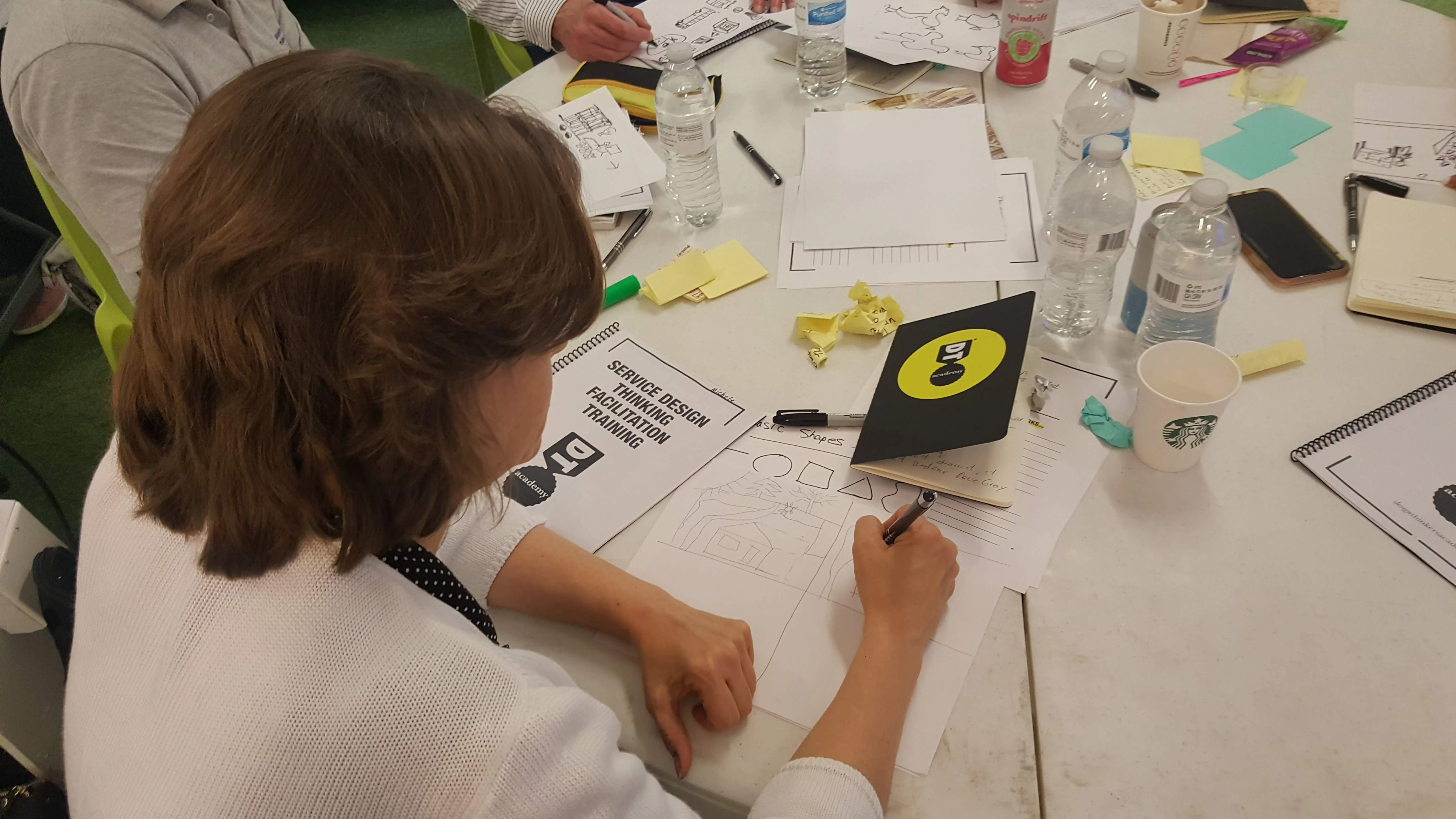Written by Terri Burch
Facilitation can make or break the outcomes of a meeting, training, or strategy session. This is one reason why our 2-day design thinking facilitation is our most popular course at DT Academy. One of the biggest challenges with the application of design thinking is often not an issue of whether the methodology really works, but rather having the appropriate facilitation skills to help guide the design team to the desired outcome.
“Facilitation is the art of guiding people through a process to extract an outcome that encourages inclusion, participation, collaboration, ownership and creativity.”
– Terri Burch, DT Academy
FIRST DETROIT FACILITATION COURSE
This past June 10th and 11th we hosted our first DT Academy facilitation course in Detroit. The course was held at the Detroit Center of Design and Technology (part of Lawrence Technological University) with 20 professionals and 3 other DTG instructor coaches, Marc Bolick, DTG Managing Director accompanied by senior instructors Ezequiel Williams of Miami and Steve Bosak of Washington DC.
This first Detroit facilitation course had participants from organizations in the insurance, banking, consumer electronics, higher education, design and consulting sectors, with people traveling from East and West coast of USA as well as several locations in Canada.
In the spirit of learning by doing, participants are divided into teams and assigned a design challenge to tackle as the course tracks the arc of design thinking from research through to prototyping and testing. Because this course if focused on building facilitation skills, each participant has one or more opportunities to facilitate their teammates through a design thinking activity.
After each facilitation round, the person facilitating the activity receives feedback from their team and from the DT Academy coaches about what they did well and what areas they could improve upon as a facilitator. People learn a lot from their facilitation opportunity, and they also learn from watching others facilitate and observing the strengths and weaknesses of their peers in the course.
For the DT Academy coaches this course has a lot of ‘moving parts’ and requires careful observation of participants as they practice their facilitation craft. The course is fast-paced and intense, but the participants are all made better for the experience and leave with refined skills and increased capacity in design thinking facilitation.
DESIGN CHALLENGE
Although learning design thinking is not the primary focus of this course, we use the idea of tackling a design challenge as an experiential learning framework for the participants to practice their facilitation skills. Even though this course was based in Detroit we did not choose the usual manufacturing or automotive related challenge. Instead the challenge focused on one of Detroit’s other famous exports: Entertainment.
“How might we reimagine the entertainment scene in Detroit?”
This challenge was most fitting with Detroit’s new entry into becoming a desirable city to visit, like noted in this recent Forbes article, Fun Reasons to Vacation in Reborn Detroit. With this challenge, participants were able to imagine or better yet, reimagine what the next level of entertainment might look like for Detroit residents, visitors, and enthusiasts alike.
Detroit is a city known for culture, design, and entertainment. It is the birthplace of Motown soul and electronic music and known for signature dance moves like the hustle and jit. Recently, Detroit has appointed a night time economy ambassador, Adrian Tonon, to focus on improving the nightlife and relations between business, residents, visitors and local government.
Detroit is also the only city in the US designated as a UNESCO City of Design. It is known around the world for its gritty culture and its leadership in design and innovation in areas like manufacturing and architecture. Detroit has also gained international recognition for its art, museums, theatre district and, of course, its Motown music. With this rich background to draw from, participants had a rich backdrop to work within and they jumped right in using design thinking to explore the challenge.
FACILITATION INSIGHTS FROM DETROIT
Each participant had an opportunity to practice their facilitation skills as they facilitated their team through a different aspect of the design thinking process. Because the challenge was focused on Detroit, participants had the opportunity to go out into the city and talk with people about their entertainment experiences in the city. They learned about Detroit from the locals and were able to gather lots of qualitative data and develop key insights.
Course participants led their team through research, sense-making, reframing, ideation and prototyping. Even though the focus was on providing feedback to the facilitator of each session, teams came up with some pretty creative solutions. For example, one team created an application that would grow with the user’s interests and make suggestions on what to do. Another focused on the needs of the entertainer and created a Detroit-based platform that would allow entertainers to find gigs and opportunities seamlessly.
After two long, energetic days of hard work and fun, participants graduated from the course and left excited to take their new learnings back to their organizations. Our whole facilitation team was once again exhausted after two days of hard work, and super pleased with another group of design thinking professionals who were able to hone and improve their skills and ‘art of facilitation.’
Facilitation skills must be developed continuously, no matter what your experience level. It takes practice – a lot of it – and we are constantly learning new ways to refine our skills and learn new techniques.
Facilitation is an art or, perhaps, even more like magic. According to the authors of the book, Unlocking the Magic of Facilitation, when you’re in the presence of magical facilitation, you’ll experience the following: 1) Time Flies, 2) Everyone stays engaged, and 3) Everyone grows, even the facilitator.

